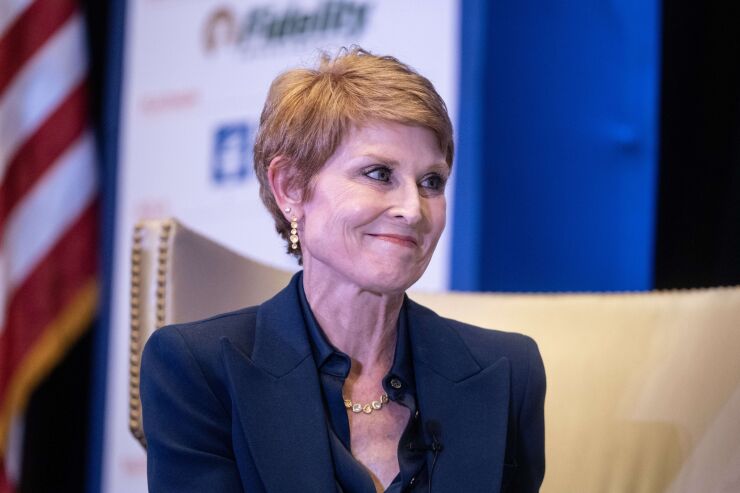The Federal Reserve, financial markets, the upcoming election and artificial intelligence took center stage on Tuesday as roughly 1,300 members of Chicago’s business community crowded into a packed ballroom for the Executives’ Club of Chicago’s
Quoting Warren Buffett, Charlie Munger and Voltaire, the panelists made their predictions for 2024 and shared highlights of the past year. The audience got to make some forecasts, too; a hand-raising poll of the room found more than half thought the Dow will close the year higher, and the majority thought interest rates will end the year lower.
After the Fed embarked on its most aggressive round of credit tightening since the 1980s, inflation has slowed, but panelist Diane Swonk, chief economist at KPMG, peered into the
Bloomberg News
“They were discussing additional rate hikes, not rate cuts,” she said. “The Fed doesn’t want to cut and then have to reverse course and raise rates again. They need to see [more] evidence” in order to cut rates.
She also saw “blind faith” from financial markets. Watching markets rally on expectations of rate cuts, she said, it seemed to her they were as overconfident now that the Fed will cut as they were sure a year ago that the Fed would trigger a recession.
Joining Swonk on the panel were John W. Rogers, Jr., chairman and co-CEO of Ariel Investments, and Bob Froehlich, owner of local minor league baseball team the Kane County Cougars and former vice chairman of Deutsche Asset Management. Syndicated columnist and author Terry Savage moderated.
Rogers likewise questioned conventional wisdom, arguing that now is a good time to invest in small-value stocks and that the Magnificent Seven (Alphabet, Amazon, Apple, Meta, Microsoft, Nvidia and Tesla) will be down by this time next year.
As for the Fed, he said, “We’re very optimistic that they have money supply under control.” He put the chances of recession at less than 10%, but said he’d start to worry more as it gets closer to 2025.
“How did we beat the odds over the last year?” asked Swonk, referring to the recession that never materialized. The answer, in part: resilient U.S. consumers — “the healing of both household and consumer balance sheets helped carry us through” — and employment gains in three sectors.
Healthcare, leisure and hospitality and state and local government hiring comprised the bulk of employment gains over the last six months, Swonk noted. But those highly concentrated gains also made the economy more vulnerable to external shocks; the United Auto Workers and actors’ strikes, for example, significantly slowed private sector employment.
“That underscores the fragility that we face” in 2024, she said. Yet she celebrated the labor market’s ending the year on an upswing, highlighting strong prime-age female labor force participation, particularly by women of color.
The panelists also worried about policy uncertainty brought on by the coming election and the prospect of an isolationist administration in the White House.
“To have our American society so divided is something that I’d never imagined,” said Rogers. “The lack of trust in our political system is really troubling… But I also do believe that our capitalist democracy is the best system.”

The Executives’ Club of Chicago
Froehlich seemed less concerned than his fellow panelists, saying decisions by the Fed matter more than who’s in the White House.
Artificial intelligence proved one of the most controversial topics of the afternoon, with Savage quipping: “The real question in my mind is, has artificial intelligence become more dangerous than natural stupidity?”
Rogers drew parallels to the dot-com bubble. He noted that the Magnificent Seven went up 87% last year, and he stressed the valuation gap between them and small-cap stocks.
“The last time the valuation gap was this large was during the 1990s dot-com era,” he said. “And you all remember how that ended… Now AI is the hottest thing in the world; companies that are involved in AI, their stocks can just explode. [But] it’s going to end the same way.”
For his part, Froehlich sang the praises of robotics and AI. He predicted they will “change the world forever,” like smartphones and social media have.
“It doesn’t sleep,” he said of AI. “It doesn’t take a lunch break… It’s clearly here to stay.”
Despite all the current buzz about AI, Froelich listed it as one of three issues that have received too little attention – the other two being the water supply and China.
“It’s the biggest crisis we’re facing, and basically no one is focusing on it,” Froelich said of
And despite the real estate market collapse in China, Froehlich remained bullish on the world’s second most populous country. He said China’s burgeoning workforce outweighs its burst housing bubble.
“Where the jobs are usually ends up being where the economic growth is,” he said.
Back in America, whether the Fed cuts three times this year (Rogers’ prediction) or eight times (Froehlich’s), the panelists agreed there will be no broader recession, although Swonk said that some sectors, like the freight industry, are already facing recession.
“A soft landing is not the same as no landing,” she said.
